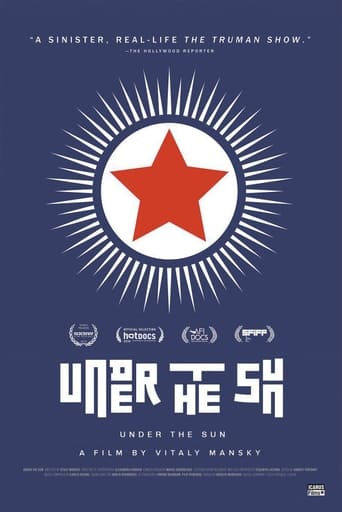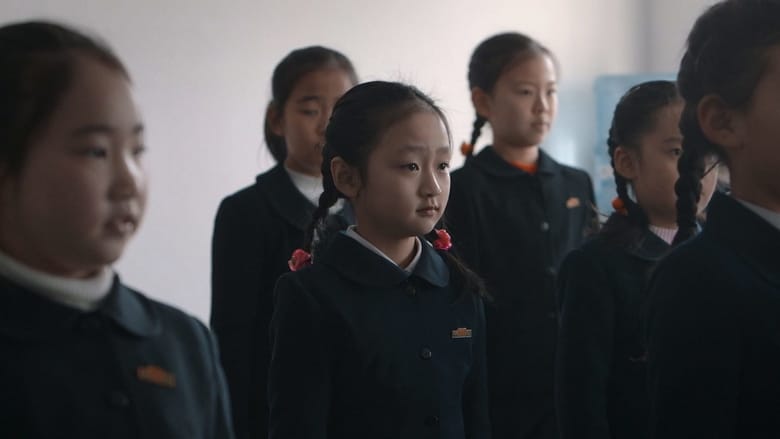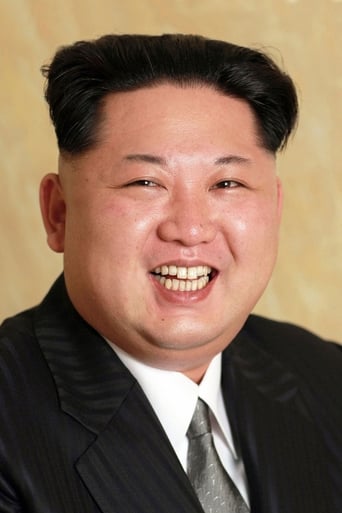
Under the Sun
October. 30,2015Over the course of one year, this film follows the life of an ordinary Pyongyang family whose daughter was chosen to take part in Day of the Shining Star (Kim Jong-il's birthday) celebration. While North Korean government wanted a propaganda film, the director kept on filming between the scripted scenes. The ritualized explosions of color and joy contrast sharply with pale everyday reality, which is not particularly terrible, but rather quite surreal.
Similar titles


Reviews
Don't listen to the Hype. It's awful
Beautiful, moving film.
Not sure how, but this is easily one of the best movies all summer. Multiple levels of funny, never takes itself seriously, super colorful, and creative.
This is one of the best movies I’ve seen in a very long time. You have to go and see this on the big screen.
This is a documentary that sheds an unflattering light on the propaganda machine within the hermit kingdom known as North Korea. It's safe to wager that Russian filmmaker Vitaliy Manskiy didn't tell DPRK officials of his plans ahead of time.To the North Korean government, the premise of the documentary is to follow an ideal family as their 8-year-old daughter, Lee Zin-mi, prepares to join the Children's Union (run by the Workers' Party) on the Day of the Shining Star (that's a fancy term for the North's "founder", Kim Jong-il's birthday). It's a great idea for a propaganda film! Anything that spews respect and admiration for the Great Leader will go over well in North Korea. Not to mention the reassurance and comfort the citizens will feel knowing how great and wonderful and protective Big Brother is.What we end up seeing, however, is less propaganda and more how a propaganda film is made and that's not exactly favorable to the regime. The family patriarch, whose name we never do learn, is a print journalist, but that doesn't fit with the filmmaker's (government handlers') vision. For this "documentary", Zin-mi's father is an engineer in a garment factory. The reason for this sudden change of career becomes rather evident a little later during a ridiculously staged event. Mother works at a soy milk factory, an "essential job" that contributes to the excellent health of her family and friends. "Workshop" as the Handler likes to correct, "Not a factory." And it's not friend, it's Comrade because "it sounds better." It doesn't take too long to see where this film is going. Manskiy's handlers have scripted nearly every move the camera makes, and every word spoken.The handlers are master exploiters, and the exploited are terrified. You can see it in their expressions and in their actions. If this were a movie you'd be laughing at the horrible acting. But this isn't acting, it's real. Frighteningly real. It's what happens after the camera supposedly stops rolling that makes this documentary. Manskiy dutifully films the action his handlers have scripted, almost as if he acquiesced to his role of propaganda cameraman. Unbeknownst to his handlers though, it is them who will be the stars of this film because the camera continues to record long after they believe it to be off. The manipulator becomes the manipulated.TWO things you'll LIKE about "Under the Sun": 1) You'll learn a few things about North Korea, and you'll be thankful you don't live there. 2) There is no narrator per se, but there is some written text that appears on the screen every so often that further analyzes (albeit subjectively) a scene. There is English subtitles for spoken dialogue. It's important to listen (read) to what is being said. There's a particularly heart-wrenching scene where Manskiy, who is filming a crying girl, asks the handler to help her. The response is as disturbing as it is sad.TWO things you'll DISLIKE: 1) Although informative, this film doesn't quite show enough of the neglected underbelly of North Korea. You won't see the starving and emaciated we often hear about. You won't see the abuses or horrifying examples of what happens to those who don't clap loud enough or aren't as effusive as they should be when instructed. Just as well, anyway, because what we do play witness to is troubling enough. 2) Some scenes are a little longer than they should be, almost to the point of being boring.
Hitch has well said that the Christian Haven can be found in North Korea. The road filled with buses, but no personal car and the micro truck shouting from the loudspeakers an Ode to the leading Gods.Lately I have seen numerous documentaries filmed in North Korea by all sort of white clowns that needed to compensate the lack of skills with something catchy, something unusual. So far the best was one made by the team at Vice in which the team actually tried to go outside the marked path. Most were more than happy to engorge in the protocol food and drink, than whip out some "life is bad" text.This one is different. The director has certainly lived all this crap somewhere in the Soviet Union and he knows where to look. Sadly the frames are hard to decode. Happily this is a document and could be seen many years after the fall of North Korea. Take the school. This is no regular school. This is a school for the Nomenklatura. One sees the segregated group of girls (Christianity at its best) in school uniforms. He films the fingernails "cut this morning", yet he catches a glimpse of the bottom half. And some of the girls are not wearing regular school trousers, but denim. And that is the ultimate piece of clothing. It is hard to see, because they were specially chosen to blend it with the uniforms.Or there is the scene with the food set for all the foreigners to see that the malnourished people have everything their heart's desires. Yet the girl is playing with the food. She knows she is not allowed to eat, but she can't help herself from touching the tasty food. And later there are the State employees searching around the room, the room with the portraits of the local Gods. It is hard to notice, but through the frames the fancy food is not touched by the family. Or how the family is lightly dressed, yet the production team has the down coats they use outside.Or the bus from the beginning. A nice, regular bus. With people getting on. Only someone cries Action! It is not a regular bus. It is one of the better buses brought in from the party depots to show how good the life can be for the people. The bus makes a terrible noise. Because even the higher ups do not have the usual comfort of the West. But still, this is not what the regular people are using.In short, hard to decode, but the best documentary on North Korea so far. By far.Contact me with Questions, Comments or Suggestions ryitfork @ bitmail.ch
Vitaly Mansky, a Russian documentary filmmaker, somehow negotiated his way into making a documentary inside North Korea. He soon discovered that he had no artistic freedom and had to follow a script that his North Korean handlers provided. The handlers gave him the opportunity to create a propaganda film focusing on an 8 year old girl, Zin-mi Lee, who lives in the capital city of Pyongyang with her parents and is about to join the Korean Children's Union on the Day of the Shining Star, the most important national holiday in North Korea, honoring their founder, Kim Il-sung.Mansky pulled a fast one on his North Korean hosts by continuing to film after the staged scenes had been shot. A crew member kept duplicate copies of memory cards with footage documenting how the North Koreans coached each scene and then smuggled them out of the country. Discovery of Mansky's ruse could have meant death or a very long imprisonment for him and his crew.The film first provides a glimpse of family life in the hermit kingdom. No effort is spared to present life in North Korea as a continuous idyllic pastime. The apartment is stocked to the brim with banquet-style food and little Zin-mi is coached in numerous takes on how to communicate the nutritional virtues of Kimchi, the Korean national dish. Apparently the eight year old wasn't spontaneous enough delivering the lines during the first few takes. Subtitles reveal that the family might not actually live in the apartment—that adults often live in barracks next to where they work and students in dormitories at their actual schools.We then move to Zin-mi's school where the teacher attempts to brainwash the students by way of repetitious drills. Children are made to recite the story of how the Japanese collaborated with evil landowners during the Japanese occupation over and over again. Only the great leader Kim Il-sung was there to thwart them. The implication of course is that the Japanese are as bad today as they were then.Later a retired general relates how evil Americans bombed innocent civilians during the Korean War, including children. Again the focus is on the distant past, with no history of subsequent developments in world affairs. Some unintentional humor is interjected when the handlers overseeing the production interrupt the General and instruct him to congratulate the children for their initial entrance into the Children's Union.Next up is the pageantry of the Children's Union ceremonies. There is a great deal of synchronized dancing and singing to martial-like music. The spectacle reminds one of Riefenstahl's "Triumph of the Will," commemorating the early rallies in Nazi Germany. The North Korean Children's Union is a worthy successor to the Hitler Youth.We then cut back to Zin-mi's father who purportedly works as a supervising engineer at a soy milk factory. Mansky relates that Zin-mi mentioned that her father was actually a journalist working for the government. The various outtakes show the North Korean producers exhorting the factory workers to be more cheerful. Again no effort is spared to present an image of complete employee satisfaction and productiveness in the workplace.The film concludes with the Day of the Shining Star celebrations—another spectacle this time featuring adults. Mansky captures the frightening aspects of the ceremony which is replete with goose-stepping soldiers, again reminiscent of Nazi Germany. After he keeps the camera rolling, the less impressive spectacle of groups of participants being directed how to leave the grounds via loudspeaker, is seen.Interspersed at certain points in the film are normal scenes of people walking on the street or in train stations. I was shocked at how quiet everyone seemed to be. Is this due to the depression of the general populace or is it based on fear of eavesdropping secret police?Mansky indicated in interviews that he made the film because he wanted to see how things could have been in Stalinist Russia. But after being in North Korea, he concluded that North Korea was far worse as far as political repression is concerned. At least in Stalinist times, culture was still alive and people still exchanged ideas. Mansky views the North Koreans as "zombies," who have no interest in learning anything outside their narrow-minded culture that features a cult of personality.After watching this documentary, I concluded that the North Koreans act the way they do as they have a deep fear of humiliation. The possibility of a "loss of face" drives them to present an image to the world that everything there is good. There is the theme that they don't need outside help and it would be too humiliating for them to admit of the deep problems endemic to their society. One must also note the deep-seated sadistic, vengeful impulses that are inculcated into peoples' minds there through propaganda and a manipulative educational system.Under the Sun feels a little too long and Mansky might have improved his documentary a bit by chopping some of the scenes involving garish spectacle. After a while, some of that propaganda stuff gets a bit overbearing. Still, Mansky has risked life and limb to bring us a truly chilling state of affairs which is North Korea today.
Under the Sun was well-received at Austin's SXSW Film Festival. It is a surreal film which was filmed by a Russian director who was given extraordinary access to film a family in Pyongyang, North Korea. Of course the entire film was scripted by the government and the director and his crew were monitored by government minders. The product is a picture of the family eating dinner, the young girl in class, the parents at work and everybody following the script. The young girl gets to join the children's union, a group that bears a striking resemblance to Hitler Youth. It is like a scene out of George Orwell that would fit well in Leni Riefenstahl propaganda film. Oddly, perhaps by accident or carelessness, the North Korean minders sometimes allowed the film crew to film some scenes where they are given instructions on what they want done in the next scene. The overall picture is eerie and it is difficult to tell whether the people just obey out of habit or out of fear. Are they complete automatons in most bizarre regime in the world? Do they even understand that there is alternative reality or have they been completely brainwashed to believe that they live in some sort of workers' paradise? While a little repetitive at times, Under the Sun is fascinating and rare chance to see inside the most isolated and repressive country on Earth. Recommended if you can deal with this sort of material.
Top Streaming Movies













